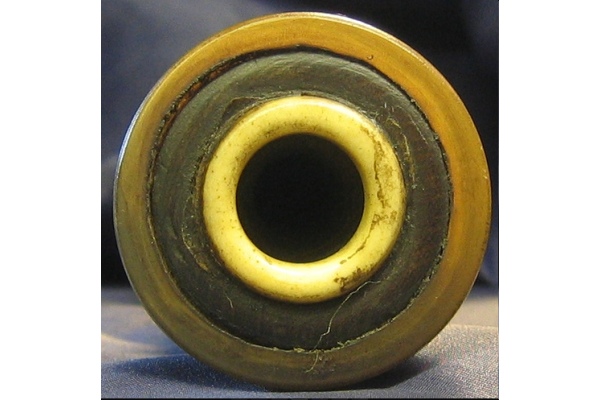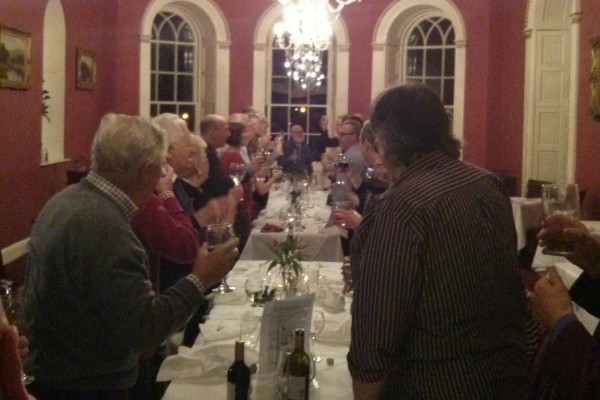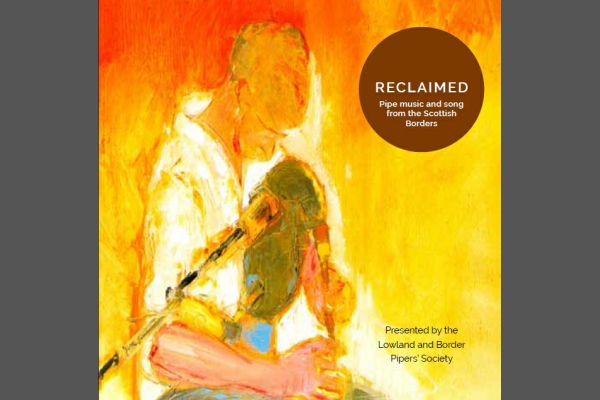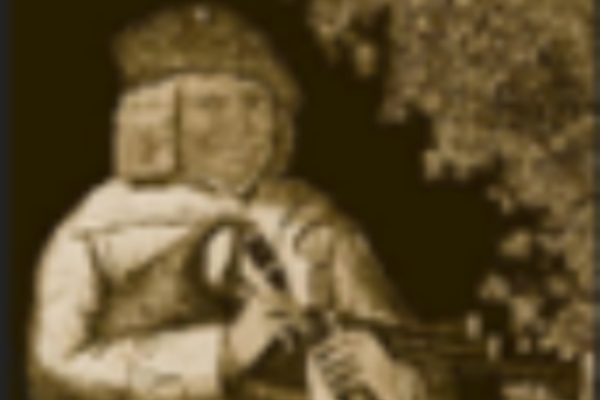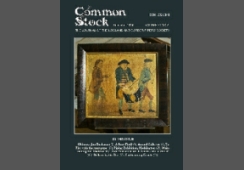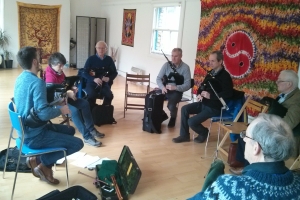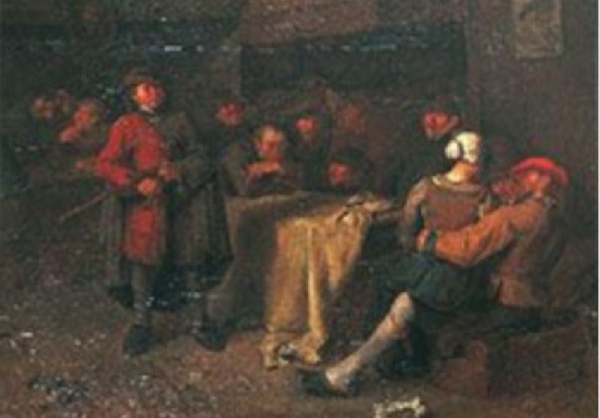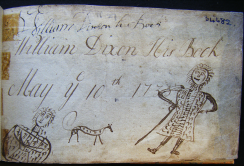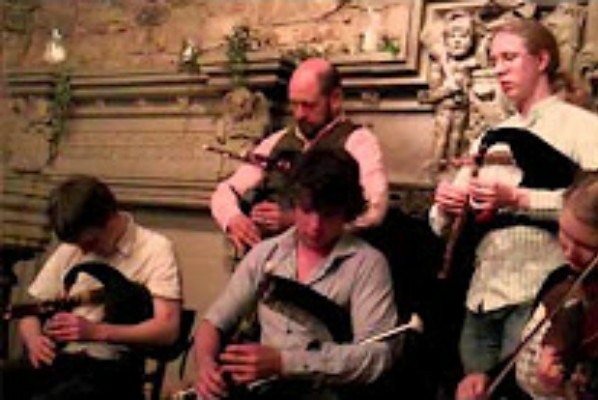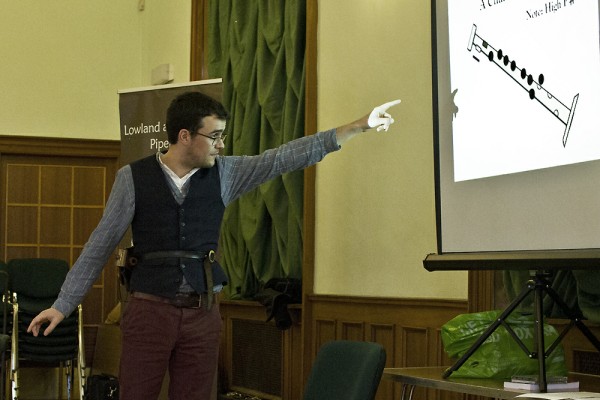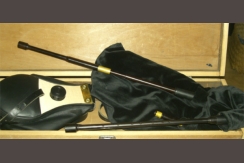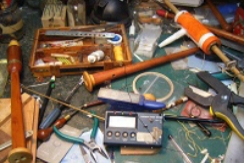Sir Walter Scott – Border Minstrel
John Nichol, Borders story-teller talks about Scott and music

Introduction
I’m not really sure why I am here, I’m a failed bagpiper. I learned two tunes – The Earl of Mansfield and Leaving Ardtornish, grace notes and all, only one of which I vaguely remember. The chanter I was given to practice on was very old and had been well-used…….
I went to learn the bagpipes and a chanter I was gi’en,
Wi’ teeth marks round the mooth-piece, it wasna awfae clean.
And when it came to practicing, I wasna in the fettle,
Until I’d washed it thoroughly wi’ TCP and Dettol.
It was very hard to blow, but I progressed to ‘the goose’. There was no further progress. The Band Hall was up a boglie close and I recall dark and cold winter Saturday evenings, walking to the Hall having just watched the latest terrifying episode of Doctor Who through half-closed eyes. I expected a Sylurian monster to emerge from every shadow.
Sir Walter Scott is Scotland’s greatest story teller. There is, however, nothing to suggest he was musical as such. So, unlike the border minstrels of old, he played neither the harp nor the pipes.
Scott’s Influences as a Child
When he was just a toddler Scott contracted Poliomyelitis……
“When the efforts of regular physicians had been exhausted, without the slightest success, my anxious parents, during the course of many years eagerly grasped at every prospect of a cure which was held out by the promise of empirics, or of ancient ladies and gentlemen who conceived themselves entitled to recommend various remedies, some of which were of a nature sufficiently singular … blood-letting!!”
As a last resort…young Walter was sent from his birthplace, Auld Reekie, to the Border farm of his grandparents at Sandyknowe to improve his health, through exercise and fresh air.
It was during those eight years at Sandyknowe that he was first exposed to the Border legends and ballads, and stories about his ancestors, told to him by his grandmother, Barbara, and tales read to him by his Auntie Jenny, who also taught young Walter to read. History of the Jacobite risings was fresh in the hearts of those who had lived through it - military veterans like Captain Dalgetty from Prestonpans, whom Walter met several times. Walter would declare that ‘the green hill and the clear blue heaven’ of the Borderland had bestowed the poetic impulse upon him.
And what about music?
As a child, Walter was often carried about among the crags at Smailholm Tower on the backs of the young ewe-milkers. He, no doubt, listened to the songs they sang, such as Jean Elliot’s words of ‘The Liltin’, “I’ve heard them liltin’ at the ewe-milkin”. This may have been Walter’s earliest experience of music.
As a teenager, Scott started to collect old ballads and translated into English those collected by others. He trained as an attorney, and was admitted to the bar and also held public office.
Scott’s first major work was published in 1802-3, Minstrelsy of the Scottish Border. When the supply of original ballads ran out, he wrote his own, The Lay of the Last Minstrel and Marmion, then he graduated to novels. His friend, James Hogg, ‘the Ettrick Shepherd’, was a musician (a fiddler) and he wrote music and songs. He also wrote ballads such as The Fray of Elibank. It’s often unclear if Hogg was trying to keep upsides with Scott or the other way round, regarding ballads and novels – but that’s another tale.
As Clerk of Court of Session in Edinburgh beginning in 1806, Scott had plenty of free time to devote to his writing, and he became the most popular author of the day.
In the 1810s he published several novels under the pseudonym Jebediah Cleisbotham or the “Author of Waverley”. The over twenty-five Waverley Novels included Ivanhoe, Rob Roy, and The Monastery, which were wildly popular in the 19th century.
Returning to the music - an important element in discovering Scott’s affinity with music - in 1802, he published the first two volumes of The Minstrelsy of the Scottish Borders – printed by James Ballantyne - Printers in Kelso.
This followed nearly ten years of fieldwork where Scott travelled all over the wilds of the Borderland collecting old ballads. - precious relics of old times that were disappearing along with the oral tradition. James Hogg’s mother (a staunch traditionalist) was a contributor but derided the work declaring, ‘ye hae spoiled them a’thegither. They were made for singin an’ no’ for readin’. But ye hae broken the charm noo and they’ll never be sung mair.
This suggests that the ballads were most often sung, a tradition dating back to the mediaeval minstrels. Scott could not fail to draw inspiration from the music that carried the narrative.
Scott and the pipes
Scott took a considerable interest in the Border pipers and in his introduction to the "Minstrelsy" he says this -
"It is certain that till a very late date, the pipers, of whom there was one attached to each Border town of note and whose office was often hereditary, were the great depository of oral and particularly poetical tradition. By means of these men much traditional poetry was preserved which must otherwise have perished."
Scott obviously saw himself as the one to continue the preservation of the ballads, but, although the words were preserved, but the music was all but lost.
As to Scott’s association with the bagpipes - The instrument certainly features in many of his novels. Being an antiquary and historian, Scott was interested to note, as mentioned in his introduction to his Minstrelsy, that from at least the early 17th century, each border town had a piper and ‘that these town pipers, an institution of great antiquity upon the Borders, were certainly the last remains of the minstrel race.
‘Robin Hastie - town piper of Jedburgh, perhaps the last of the order, died nine or ten years ago.’ (This was written about 1802) His family was supposed to have held the office for about three centuries. Robin Hastie’s forebear, John Hastie by name, is said to have piped at the Battle of Flodden.
Robin Hastie certainly played and sang ballads so we assume that he sang ballads like ‘Johnny Armstrong’ accompanied with the bagpipe., but as Scott says….Old age had rendered Robin a wretched performer, but he knew several old songs and tunes which have probably died with him. "
It’s good to know that some traditional folk musicians of today are reviving the old sung ballads. Old Willie Scott the Border Shepherd, The Corries and, more recently, Stevie Byrne and Emily Smith and their associates [Ed; not to mention our own Davy Robertson, who sings with the pipes). And, of course, that old airs are being revived and performed by our Border pipers.
Scott’s own uncle, Mr. Thomas Scott, resident at Monklaw near Jedburgh, played ‘what is called the Border or Bellows Pipe’: it was he who gave Alexander Campbell a list of the best Border pipers who lived from about the beginning of the year 1700, down till about the commencement of the year 1800.
Scott may not have been musical himself, but he appreciated music and had surprisingly extensive musical interests, particularly in piping.
Songs
Many "songs" feature in Scott’s novels – even if they are mostly songs without music, and it is left to the reader to ‘sing’ the song with their own imagined tune.
But there are some songs that are given a tune……
Blue Bonnets Over The Border (a song about Bonnie Prince Charlie’s 1745 march into England) first appeared in 1820 in the Scott’s romance, The Monastery, sung to an “ancient air” by the same name. Most likely a pipe tune. Especially since it is played successfully on the pipes without a resort to dropping an octave.
Another song written by Scott in 1825 is ‘Bonnie Dundee’ (in honour of the ruthless Jacobite, John Graham, 7th Laird of Claverhouse, and 1st Viscount Dundee). Scott used the old tune, Bonny Dundee, which is in praise of the town of Dundee rather than of Claverhouse. Again. very probably a pipe tune.
His romantic song, ‘Jock o’ Hazeldean’, is actually a reworking of an old ballad called John of Hazelgreen. The music is an old Scottish melody – it sounds more like a fiddle tune - the wide range of notes making it a nightmare to sing.
From reading Scott’s ballads and poems, it is obvious that, although not a musician or composer, he did have a keen sense of rhythm, for almost without exception, his lines scan perfectly.
He inspired many songs, operas, ballets, purely orchestral pieces, even country and folk music!
His works have yielded much for composers and the music he has inspired over 200 years has been not merely British but international. Composers such as Schubert, Beethoven, Mendelssohn, Bizet, Donizetti, to name but a few, have drawn inspiration from Scott.
It is appropriate that native Scots composers and native Scots music should be associated to a considerable degree with music inspired by Scott. ‘Rob Roy’, John Davy’s "opera".of 1828, used many old Scots songs and the general popularity of ‘Auld Lang Syne’ is said to owe much to its incorporation in Davy’s work.The lyrics of ‘Hail to the Chief’, sung at US presidential elections, came from The Lady of the Lake, which was set to music early in the 19th century by James Sanderson.
In Scott’s great tale of the supernatural, ‘Wandering Willie’s Tale’, a chapter of Redgauntlet often anthologised in its own right. [Ed; it was by performed by John himself at the Edinburgh Festival Fringe in 2002] the protagonist, Steenie Steenson, is piper to the (literally) hellishly formidable Sir Robert Redgauntlet, a red-hot prelatist who ruthlessly hunted down the desperate and defeated Covenanters.
The plot involves Steenie following Redgauntlet to Hell to reclaim a crucial receipt for rent. The story enlightens us to aspects of Border repertoire of the time - Jackie Latin, or ‘Jockie Latin’ is mentioned, ‘Hoopers and Girders’, as well as the old Borders pipes technique of the ‘backlilt’ as Scott spells it. Steenie is abused as “thou sack-doodling/doubling? son of a whore”. One wonders if this is the origin of the German term for bagpipes, Dudelsack.
When Steenie first arrives in hell and enters into the company of Redgantlet and certain other famous and ghastly revellers, he is asked if he has paid his rent arrears…..The Laird of Redgauntlet asks "Weel, Piper Steenie, hae ye settled wi' my son for the year's rent?"
Says I (when I gat my breath) Sir John would not settle without yer honour's receipt. "Ye shall hae that for a tune of the pipes, Steenie”, says the apparition. “Play us up Weel hoddled, Luckie.” I grew cauld at the name o’ that tune. I learned frae a warlock, wha’d heard it when they were worshipping Satan at their meetings. I had sometimes played it at the ranting suppers in Redgauntlet Castle, but never willingly.”
I’m sure very few, if any, here present who will know that tune. If you do, perhaps you can tell us where you learned it.

John as Sir Walter at Abbotsford
